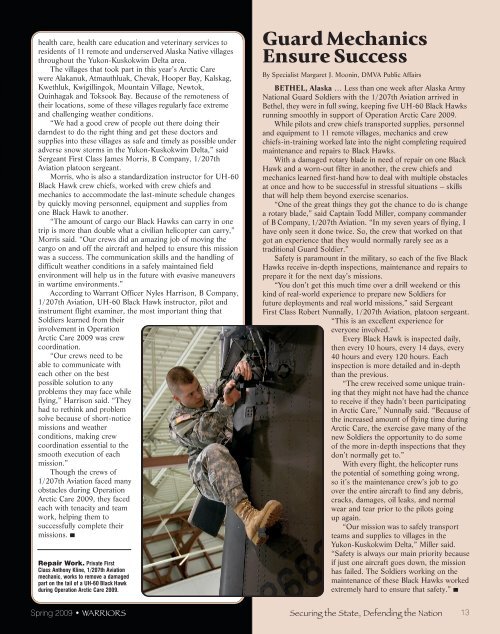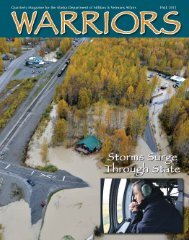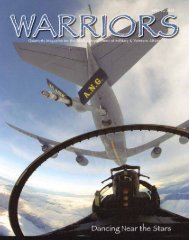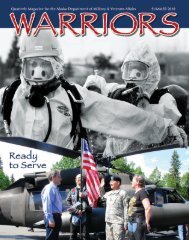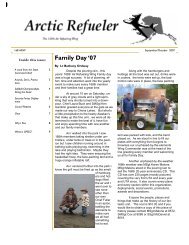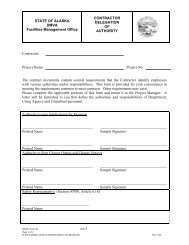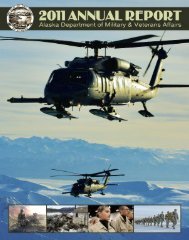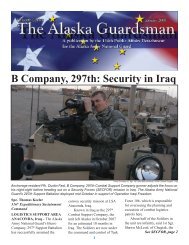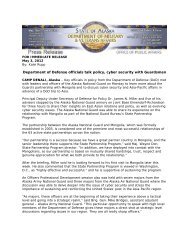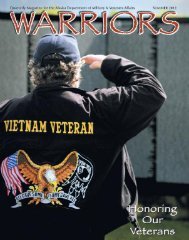Warriors - Spring 2009 - Alaska - Department of Military and ...
Warriors - Spring 2009 - Alaska - Department of Military and ...
Warriors - Spring 2009 - Alaska - Department of Military and ...
You also want an ePaper? Increase the reach of your titles
YUMPU automatically turns print PDFs into web optimized ePapers that Google loves.
health care, health care education <strong>and</strong> veterinary services to<br />
residents <strong>of</strong> 11 remote <strong>and</strong> underserved <strong>Alaska</strong> Native villages<br />
through out the Yukon-Kuskokwim Delta area.<br />
The villages that took part in this year’s Arctic Care<br />
were Alakanuk, Atmauthluak, Chevak, Hooper Bay, Kalskag,<br />
Kwethluk, Kwigillingok, Mountain Village, Newtok,<br />
Quinhagak <strong>and</strong> Toksook Bay. Because <strong>of</strong> the remoteness <strong>of</strong><br />
their locations, some <strong>of</strong> these villages regularly face extreme<br />
<strong>and</strong> challenging weather conditions.<br />
“We had a good crew <strong>of</strong> people out there doing their<br />
darndest to do the right thing <strong>and</strong> get these doctors <strong>and</strong><br />
supplies into these villages as safe <strong>and</strong> timely as possible under<br />
adverse snow storms in the Yukon-Kuskokwim Delta,” said<br />
Sergeant First Class James Morris, B Company, 1/207th<br />
Aviation platoon sergeant.<br />
Morris, who is also a st<strong>and</strong>ardization instructor for UH-60<br />
Black Hawk crew chiefs, worked with crew chiefs <strong>and</strong><br />
mechanics to accommodate the last-minute schedule changes<br />
by quickly moving personnel, equipment <strong>and</strong> supplies from<br />
one Black Hawk to another.<br />
“The amount <strong>of</strong> cargo our Black Hawks can carry in one<br />
trip is more than double what a civilian helicopter can carry,”<br />
Morris said. “Our crews did an amazing job <strong>of</strong> moving the<br />
cargo on <strong>and</strong> <strong>of</strong>f the aircraft <strong>and</strong> helped to ensure this mission<br />
was a success. The communication skills <strong>and</strong> the h<strong>and</strong>ling <strong>of</strong><br />
difficult weather conditions in a safely maintained field<br />
environment will help us in the future with evasive maneuvers<br />
in wartime environments.”<br />
According to Warrant Officer Nyles Harrison, B Company,<br />
1/207th Aviation, UH-60 Black Hawk instructor, pilot <strong>and</strong><br />
instrument flight examiner, the most important thing that<br />
Soldiers learned from their<br />
involvement in Operation<br />
Arctic Care <strong>2009</strong> was crew<br />
coordination.<br />
“Our crews need to be<br />
able to communicate with<br />
each other on the best<br />
possible solution to any<br />
problems they may face while<br />
flying,” Harrison said. “They<br />
had to rethink <strong>and</strong> problem<br />
solve because <strong>of</strong> short-notice<br />
missions <strong>and</strong> weather<br />
conditions, making crew<br />
coordination essential to the<br />
smooth execution <strong>of</strong> each<br />
mission.”<br />
Though the crews <strong>of</strong><br />
1/207th Aviation faced many<br />
obstacles during Operation<br />
Arctic Care <strong>2009</strong>, they faced<br />
each with tenacity <strong>and</strong> team<br />
work, helping them to<br />
successfully complete their<br />
missions. ■<br />
Repair Work. Private First<br />
Class Anthony Kline, 1/207th Aviation<br />
mechanic, works to remove a damaged<br />
part on the tail <strong>of</strong> a UH-60 Black Hawk<br />
during Operation Arctic Care <strong>2009</strong>.<br />
Guard Mechanics<br />
Ensure Success<br />
By Specialist Margaret J. Moonin, DMVA Public Affairs<br />
BETHEL, <strong>Alaska</strong> … Less than one week after <strong>Alaska</strong> Army<br />
National Guard Soldiers with the 1/207th Aviation arrived in<br />
Bethel, they were in full swing, keeping five UH-60 Black Hawks<br />
running smoothly in support <strong>of</strong> Operation Arctic Care <strong>2009</strong>.<br />
While pilots <strong>and</strong> crew chiefs transported supplies, personnel<br />
<strong>and</strong> equipment to 11 remote villages, mechanics <strong>and</strong> crew<br />
chiefs-in-training worked late into the night completing required<br />
maintenance <strong>and</strong> repairs to Black Hawks.<br />
With a damaged rotary blade in need <strong>of</strong> repair on one Black<br />
Hawk <strong>and</strong> a worn-out filter in another, the crew chiefs <strong>and</strong><br />
mechanics learned first-h<strong>and</strong> how to deal with multiple obstacles<br />
at once <strong>and</strong> how to be successful in stressful situations – skills<br />
that will help them beyond exercise scenarios.<br />
“One <strong>of</strong> the great things they got the chance to do is change<br />
a rotary blade,” said Captain Todd Miller, company comm<strong>and</strong>er<br />
<strong>of</strong> B Company, 1/207th Aviation. “In my seven years <strong>of</strong> flying, I<br />
have only seen it done twice. So, the crew that worked on that<br />
got an experience that they would normally rarely see as a<br />
traditional Guard Soldier.”<br />
Safety is paramount in the military, so each <strong>of</strong> the five Black<br />
Hawks receive in-depth inspections, maintenance <strong>and</strong> repairs to<br />
prepare it for the next day’s missions.<br />
“You don’t get this much time over a drill weekend or this<br />
kind <strong>of</strong> real-world experience to prepare new Soldiers for<br />
future deployments <strong>and</strong> real world missions,” said Sergeant<br />
First Class Robert Nunnally, 1/207th Aviation, platoon sergeant.<br />
“This is an excellent experience for<br />
everyone involved.”<br />
Every Black Hawk is inspected daily,<br />
then every 10 hours, every 14 days, every<br />
40 hours <strong>and</strong> every 120 hours. Each<br />
inspection is more detailed <strong>and</strong> in-depth<br />
than the previous.<br />
“The crew received some unique training<br />
that they might not have had the chance<br />
to receive if they hadn’t been participating<br />
in Arctic Care,” Nunnally said. “Because <strong>of</strong><br />
the increased amount <strong>of</strong> flying time during<br />
Arctic Care, the exercise gave many <strong>of</strong> the<br />
new Soldiers the opportunity to do some<br />
<strong>of</strong> the more in-depth inspections that they<br />
don’t normally get to.”<br />
With every flight, the helicopter runs<br />
the potential <strong>of</strong> something going wrong,<br />
so it’s the maintenance crew’s job to go<br />
over the entire aircraft to find any debris,<br />
cracks, damages, oil leaks, <strong>and</strong> normal<br />
wear <strong>and</strong> tear prior to the pilots going<br />
up again.<br />
“Our mission was to safely transport<br />
teams <strong>and</strong> supplies to villages in the<br />
Yukon-Kuskokwim Delta,” Miller said.<br />
“Safety is always our main priority because<br />
if just one aircraft goes down, the mission<br />
has failed. The Soldiers working on the<br />
maintenance <strong>of</strong> these Black Hawks worked<br />
extremely hard to ensure that safety.” ■<br />
<strong>Spring</strong> <strong>2009</strong> • WARRIORS Securing the State, Defending the Nation<br />
13


